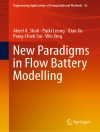Professor Akeel Shah graduated with a first-class honours degree in Mathematical Physics in 1995 and a Ph.D. in Applied Mathematics (both from University of Manchester Institute of Science and Technology) in 2001. He is currently a professor in the School of Energy and Power Engineering at the Chongqing University, China, with expertise in electrochemical energy conversion, computational engineering and applied machine learning. He previously held positions at University of Southampton and University of Warwick. His work is primarily focused on the modelling and simulation of energy conversion devices, including computational modelling, and the development of fast algorithms for computer codes in science and engineering based on machine learning and computational statistics. Between 2004 and 2006, he held a joint Pacific Institute of Mathematics Sciences (PIMS) and Mathematics of Information Technology and Complex Systems (MITACS) Fellowship. He is the author of over 85 publicationsin leading international peer-reviewed journals. Professor Shah has worked closely with the fuel cell and battery industry (Ballard Power Systems, Johnson Matthey Plc, Sharp Laboratories, ACAL Energy Ltd) to develop models/numerical codes for design purposes. He has received funding from the TSB, FP7, DSTL and directly from industry.
Professor Puiki Leung is currently a professor in the School of Energy and Power Engineering at the Chongqing University, China. He holds a B.Eng. in Mechanical Engineering (2008) and a Ph.D. in Electrochemical Engineering from the University of Southampton (2011). He has completed his postdoctoral research at institutes such as the University of Oxford, the University of Warwick and Hong Kong University of Science and Technology, where he worked on a variety of electrochemical technologies (batteries, organic synthesis, CO2 reduction). His research interests include functional materials for energy conversion and storage applications. Heis the author of more than 50 publications in relevant fields.
Professor Qian Xu received his Ph.D. degree in Mechanical Engineering from the Hong Kong University of Science and Technology in July 2013 and worked as a postdoctoral researcher at the same university until August 2014. In 2017, he worked at University of Waterloo, Canada, as a visiting scholar. Currently, he is a full professor at Institute for Energy Research, Jiangsu University, China. He has received more than ten research grants from the National Natural Science Foundation of China, China Postdoctoral Foundation and industry, and has made contributions in the areas of fuel cells, redox flow batteries, multi-scale multiphase heat and mass transport with electrochemical reactions and computational modelling. He has published over 90 peer-reviewed journal papers (4 of them are ESI hot papers) and 2 academic books with more than 2850 citations (Google Scholar, H-Index 26) and applied 21 patents with 5 issued. He serves as the member of Editorial Board of Processes (MDPI), International Journal of Green Energy, as well as the reviewer for more than 30 international academic journals. He received the “Six Talent Peaks” award of Jiangsu Province, China, in 2016.
Professor Pang-Chieh Sui currently holds dual appointments at the Wuhan University of Technology (WUT, from 2016) and Tsinghua-Sichuan Energy Internet Research Institute (EIRI, from 2018). Prior to joining the WUT/EIRI, he was a senior researcher and Tech Lab manager at the University of Victoria (Canada) during 2003–2015 and research scientist at National Advanced Driving Simulator (USA) during 1997–2003. Dr. Sui received a bachelor degree from National Tsing Hua University in 1986, M.S. and Ph.D. from University of Iowa, USA, in 1992 and 1997, respectively. Dr. Sui’s general research interests are: transport phenomena, polymer electrolyte membrane fuel cells, combustion and spray, and integrated energy systems. His specific expertise includes modelling and simulation of fuel cells using macro-, meso- and microscopic computational methods; experimental techniques for fuel cell materials characterization; development and validation for fuel cell simulation tools. He is a recipient of the Hanse-Wissenschaftskolleg Fellowship of Germany (2015), the 6th Hubei 100 Talent Plan Award (2016), the Sichuan-1000 Plan (2019) and the Overseas, Hong Kong & Macao Scholars Collaborated Researching Fund of China (2014).
Dr. Wei W. Xing received his Ph.D. in Engineering in 2017 from the University of Warwick, UK. He worked as a postdoctoral fellow in the Scientific Computing Institute (SCI) at the University of Utah from 2017 to 2020. Since then, he has been an assistant professor, granted the title of university distinguish young fellow, in Beihang University, China. He has published more than 20 SCI papers and joined many national grand programs, e.g. DARPA, EPSRC and DECC. His research interest is mainly in machine learning for engineering, including surrogate models, Bayesian optimization, inverse problems, digital twins and uncertainty quantification.
3 Электронные книги Pang-Chieh Sui
Joey Jung & Pang-Chieh Sui: Hydrometallurgical Recycling of Lithium-Ion Battery Materials
The expanding market share of lithium-ion batteries (LIBs), driven by the secondary battery and electric vehicle markets, has consequently led to the accumulation of spent LIBs. This presents a uniqu …
PDF
английский
DRM
€180.55
Joey Jung & Pang-Chieh Sui: Hydrometallurgical Recycling of Lithium-Ion Battery Materials
The expanding market share of lithium-ion batteries (LIBs), driven by the secondary battery and electric vehicle markets, has consequently led to the accumulation of spent LIBs. This presents a uniqu …
EPUB
английский
DRM
€179.56
Akeel A. Shah & Puiki Leung: New Paradigms in Flow Battery Modelling
This book provides a comprehensive review of the latest modelling developments in flow batteries, as well as some new results and insights. Flow batteries have long been considered the most flexible …
PDF
английский
€171.19



